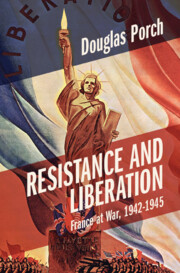Book contents
- Resistance and Liberation
- Armies of the Second World War
- Resistance and Liberation
- Copyright page
- Contents
- Figures
- Maps
- Preface
- Abbreviations
- 1 Tunisia
- 2 “A Sort of Resurrection of France”
- 3 Triumph and Dishonor in Italy
- 4 Resistance on the Eve of D-Day
- 5 “The Supreme Battle”
- 6 Anvil/Dragoon
- 7 L’amalgame
- 8 Les Vosges
- 9 Rhine and Danube
- 10 Conclusion
- Notes
- Bibliography
- Index
6 - Anvil/Dragoon
Published online by Cambridge University Press: 05 January 2024
- Resistance and Liberation
- Armies of the Second World War
- Resistance and Liberation
- Copyright page
- Contents
- Figures
- Maps
- Preface
- Abbreviations
- 1 Tunisia
- 2 “A Sort of Resurrection of France”
- 3 Triumph and Dishonor in Italy
- 4 Resistance on the Eve of D-Day
- 5 “The Supreme Battle”
- 6 Anvil/Dragoon
- 7 L’amalgame
- 8 Les Vosges
- 9 Rhine and Danube
- 10 Conclusion
- Notes
- Bibliography
- Index
Summary
The Dragoon landings succeeded at relatively little cost largely because Hitler ordered German forces in the south of France to retreat. Controversy over the seizure of Toulon and Marseille revealed command tensions at the summit of l’Armée B that would simmer for the remainder of the war. Despite considerable efforts to arm resistance in France, its military contribution to liberation disappointed expectations. Nevertheless, various personalities and political factions in France, beginning with de Gaulle, attempted to exploit resistance as a source of political legitimacy and/or to further personal ambition. While the BBC kept captive populations informed, and propaganda helped to discredit collaboration, inspire hope for liberation, and encourage certain forms of resistance, it succeeded neither in transforming resistance into a mass movement nor in triggering a national insurrection. In the end, the Germans were defeated by military force, not propaganda. Nevertheless, the image of popular resistance helped to rehabilitate France’s image tarnished by 1940 followed by Vichy collaboration, as well as to legitimize de Gaulle, all of which smoothed the transition of power from Vichy to the GPRF while dodging civil war. France’s popular mobilization also testified to republican renewal, which helped to rehabilitate France’s status as a minor ally. Beyond its negligible operational impact, historians struggle to calculate the influence of resistance activity, in part because intangible psychological and morale factors are impossible to quantify. France would have been liberated in any case without the resistance, but perhaps not on the same terms. Despite the momentary disorder, even anarchy, of the Liberation, ultimately the resistance helped to smooth the transition from Vichy to the GPRF. But its memorial image was conflicted by political infighting and violent acts that brought down retribution on the French population. Furthermore, the post-war mythification of national “resistance” not only distorted its nature and contribution to victory. It also exiled from France’s wartime memory other victims of war and occupation to include POWs, STO, Jews, and even les forces françaises libres.
Keywords
Information
- Type
- Chapter
- Information
- Resistance and LiberationFrance at War, 1942-1945, pp. 370 - 429Publisher: Cambridge University PressPrint publication year: 2024
